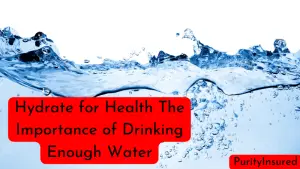Water is an essential element for human survival and plays a vital function in maintaining general health and well-being. Our bodies rely on water for numerous functions, from regulating body temperature to facilitating the transportation of nutrients and waste products. In this article, we will delve into the significance of hydration and the importance of ingesting enough water. We will explore the effects of dehydration, factors influencing water needs, how to decide foremost water intake, practical hydration tips, debunking myths, and unique issues for unique groups.

Understanding the Role of Water in the Body:
Water is more than simply a thirst-quencher; it is a essential nutrient that our our bodies require for proper functioning. Comprising approximately 60% of our body weight, water serves numerous important functions. It helps modify frame temperature, lubricates joints and tissues, aids in digestion and circulation, and permits the delivery of essential nutrients and waste products in the course of the body.
Signs and Consequences of Dehydration:
Dehydration happens while the frame loses greater fluids than it takes in, main to an imbalance that impacts various physical functions. Common signs of dehydration encompass accelerated thirst, dry mouth, fatigue, dizziness, and darkish urine. Short-term effects of dehydration can range from moderate soreness to intense complications, such as heatstroke. Chronic dehydration, if left untreated, can have long run consequences, which includes impaired cognitive function, kidney stones, and reduced bodily performance.
Factors Influencing Water Needs:
The amount of water each man or woman desires can vary based totally on several factors. These include age, sex, weight, interest level, climate, and overall health. Pregnant or breastfeeding women, older adults, and individuals with certain fitness conditions may have unique hydration requirements. Additionally, bodily activity and environmental factors, such as excessive temperatures or humidity, can increase water wishes due to increased sweat loss.
Determining Optimal Water Intake:
While general pointers advocate consuming 8 glasses of water according to day (about 2 liters), best water consumption is surprisingly individualized. Factors like body size, pastime level, and climate have to be taken into consideration when figuring out private hydration needs. Listening to our body’s thirst signals can also serve as a useful indicator. It is critical to word that water intake can come from various sources, which includes now not handiest simple water but additionally fruits, vegetables, and different beverages.
Hydration Tips and Strategies:
To make certain good enough hydration, it is crucial to incorporate sensible hints into our day by day routine. These can include wearing a water bottle, setting reminders to drink water, infusing water with culmination or herbs for flavor, and ingesting hydrating ingredients like watermelon and cucumbers. Developing healthful hydration habits, such as consuming water before food and all through bodily activity, can assist hold choicest hydration levels.
Myths and Misconceptions about Hydration:
There are numerous misconceptions surrounding water consumption and hydration. One not unusual myth is that thirst is a reliable indicator of hydration status. However, thirst is not continually an accurate measure, mainly in sure people like older adults who may additionally have dwindled thirst sensations. Another myth is that caffeinated beverages, such as coffee or tea, are dehydrating. While caffeine can have mild diuretic effects, the fluid content material in those liquids nevertheless contributes to average hydration.
Special Considerations for Certain Groups:
Different companies have unique hydration desires that should be addressed. Children and adolescents, for example, require adequate hydration for growth, development, and most excellent cognitive function. Pregnant and breastfeeding ladies want improved water consumption to support the desires of each themselves and their developing baby. Older adults ought to pay special interest to hydration as age-related modifications may additionally reduce their thirst perception. Athletes and energetic individuals, due to accelerated sweat loss, have to top off fluids to preserve overall performance and prevent dehydration.
Conclusion:
Water is an crucial detail for maintaining precise health and well-being. By know-how the position of water in the body, recognizing the symptoms and outcomes of dehydration, and thinking about factors that affect water needs, we can take proactive steps to ensure optimal hydration. Incorporating practical hydration guidelines and techniques into our each day routines, debunking myths, and recognizing the particular needs of exclusive groups can help us prioritize consuming enough water. Let us embrace the power of hydration and make it a cornerstone of our journey toward better health. Remember, a well-hydrated frame is a more healthy body.